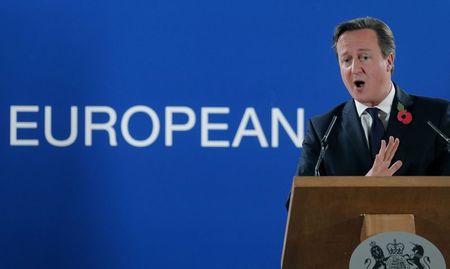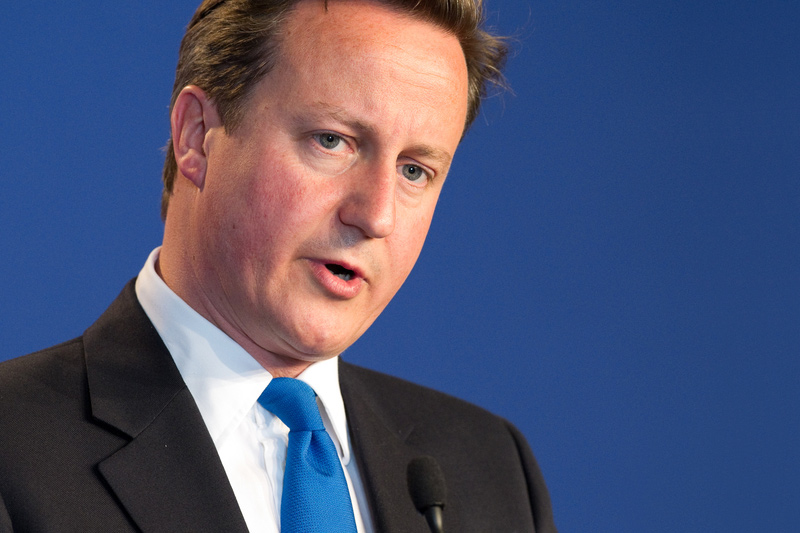By Paul Taylor and Andrew Osborn
BRUSSELS/LONDON (Reuters) - British Prime Minister David Cameron challenged a demand from the European Union for an additional 2.1-billion-euro payment into this year's EU budget after a revision of economic statistics showed his country was better off.
EU leaders, scrambling to defuse a potentially damaging row with London, agreed at a summit in Brussels that their finance ministers would hold emergency talks with the executive European Commission to review the figures in the coming weeks, diplomats said. A note from the Commission to member states set a deadline of Dec. 1 for payment.
Cameron's Eurosceptic opponents, gaining ground fast on his Conservative party ahead of a May election, seized on what EU officials called an unusually extensive version of the regular annual adjustment. They accused the prime minister of misleading voters and the EU of acting like a "thirsty vampire".
"David Cameron once claimed that he had reduced the EU budget - but the UK contribution went up and now quite incredibly, our contribution goes up a second time. It's just outrageous," said Nigel Farage, leader of the UK Independence Party, which wants to pull Britain out of the EU.
"The EU is like a thirsty vampire feasting on UK taxpayers' blood. We need to protect the innocent victims who are us."
Even Cameron's pro-European Liberal Democrat coalition partners, led by Deputy Prime Minister Nick Clegg, said it was unacceptable to change membership fees "at the drop of a hat".
Several fellow EU leaders urged Britain to respect long-standing EU rules and not blow an accounting exercise out of proportion. Finland's prime minister said Cameron should not to make "mountains out of molehills".
Cameron raised the issue on the second day of an EU summit, and European Commission President Jose Manuel Barroso responded that the rules were the rules and should not be called into question, an EU official said.
The change was based on updated figures for gross national income supplied by Britain's Office of National Statistics. London had received cash back when the financial crisis shrunk its economy in 2008. In recent years, its contribution had been adjusted upwards by up to 500 million euros ($632 million) a year on average without any objection, the official said.
"NORMAL"?
German Chancellor Angela Merkel and French President Francois Hollande also told Cameron the rules must be respected, while the Italian and Dutch prime ministers voiced support for Britain, according to the official.
According to a table sent by the Commission to governments a week ago and seen by Reuters, Berlin and Paris will receive money back while the Italians and Dutch and even Greece, which has been in recession for six straight years, will have to pay more. An EU official said the European Parliament was likely to endorse the demand for payments in a vote due on Nov. 4.
Officials said the adjustments were unusually large this year because of a once in a generation statistical exercise that recalculated national income and tax revenues back to 1995.
"We and others are rightly challenging this. What is needed is a detailed discussion by finance ministers on this," a spokesman for Cameron said, saying London wanted a "proper political level discussion" of the technical work carried out on national income by the EU statistics office Eurostat.
Italian Secretary of State for European Affairs Sandro Gozi said Rome wanted to postpone the application of the new measure, but other EU countries played down the spat.
"I think it's very important that we don't start treating the EU as some sort of a simplified accounting exercise," Finland's Stubb told reporters, noting that Britain got an annual rebate from EU coffers unlike his own country.
After that rebate, worth 5.9 billion euros this year, Britain was due to pay 14.7 billion euros into the EU's 140 billion euro annual budget. Germany is by far the biggest net contributor followed by France and Italy.
A British spokesman in Brussels said Cameron raised the matter during an economic discussion and called for a meeting of EU finance ministers to review the figures.
"This is money the European Commission was not expecting and does not need, and we will be working with other countries to do all we can to challenge this," the spokesman said.
Lithuanian President Dalia Grybauskaite, a former EU budget commissioner, said adjustments in national payments took place annually because contributions were calculated based on economic forecasts which were reviewed against the final figures.
"This is normal," she said.
The request for additional funding came at an awkward time for Cameron, who faces a general election in May with UKIP cutting into his Conservatives' share of the vote.
The Eurosceptic party looks likely to win a second seat in parliament on Nov. 20 when a lawmaker who resigned from the Conservatives is standing for UKIP in a by-election in southern England. This budget row is a gift to UKIP for that ballot.
Anti-EU right-wingers in Cameron's own party also sought to exploit the issue ahead of a referendum on EU membership that he has promised for 2017 if the Conservatives win next year's national election.
John Redwood, a leading anti-EU Conservative lawmaker, said: "He should first of all decline to pay. He should make it very clear that the UK doesn't accept retrospective taxation."

(1 US dollar = 0.7907 euro)
(Additional reporting by Alastair Macdonald and Francesco Guarascio; Writing by Paul Taylor; Editing by Alastair Macdonald)
